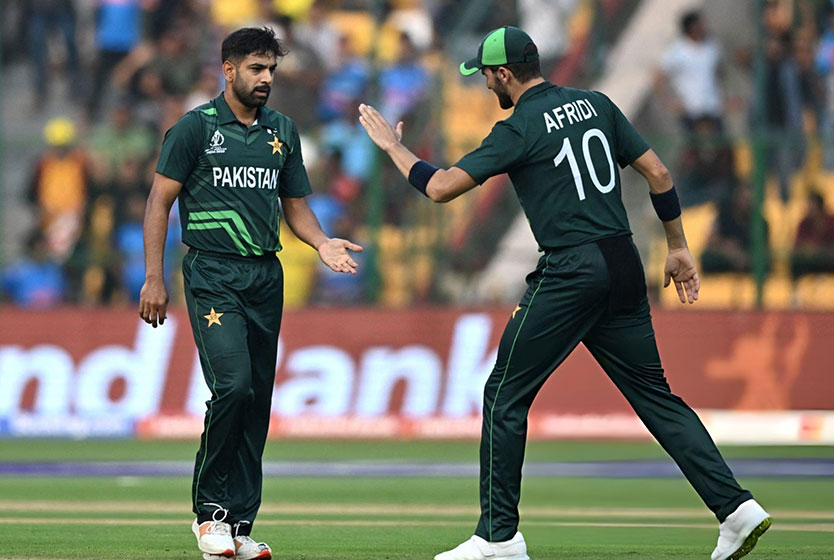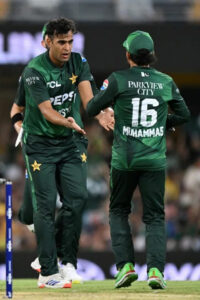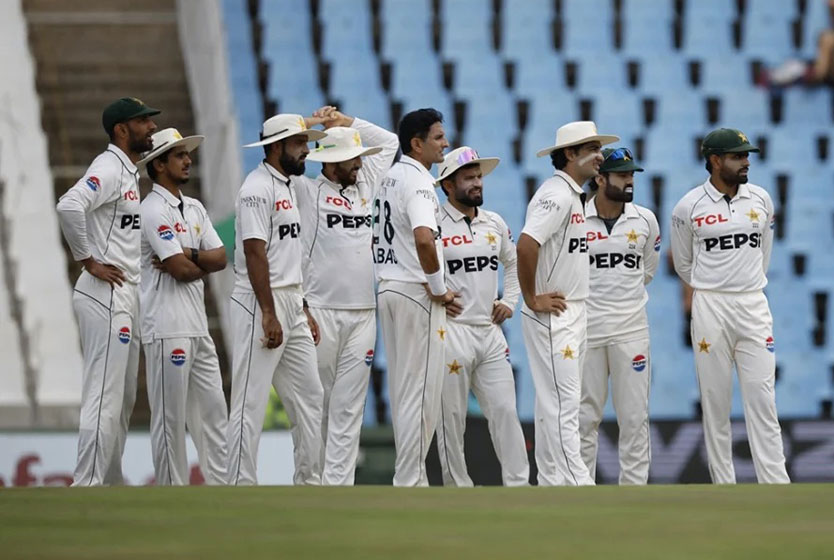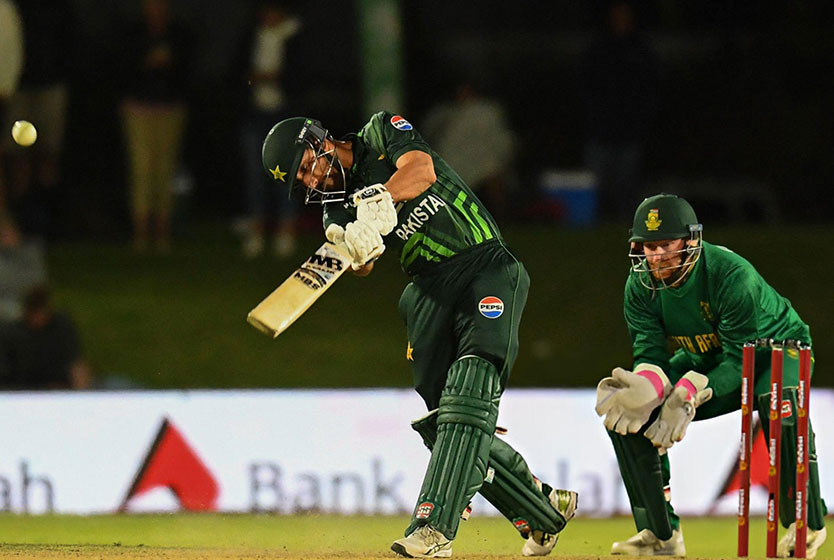
A Baptism of Fire
Fast bowling is Pakistan’s greatest fodder for metaphor. It is our glass to break in case of emergencies – may it be a lull in proceedings, the risk of irrelevance, or the desire for something clean and crisp to cut through the fog and the grime. Depending on the day and on the way the tide turns, it is either an exercise of tireless discipline or it is a raging, untethered horse.
Sometimes, the symbolism may be too overwrought for a phenomenon that is essentially just a really fast piece of wood trying to crash into other pieces of wood. Maybe fast bowling is not all that – a great messiah, the ultimate savior – and for Pakistan in the last few months, it certainly did not look like it at all. Bowling resources seemed to have depleted, team management seriously compromised, and team spirits on an unspeakably dreary level entirely. The Test series win against England late in October brought back some much-needed energy into the general cricketing atmosphere in Pakistan – but a disastrous showing at the T20 World Cup earlier this year still meant that the country’s white-ball fortunes remained suspended in doubt.
So when the commentary box announced ‘a baptism of fire for Cooper Connolly’ as Haris Rauf marked his run-up to bowl to the nascent international cricketer, it was something that would have felt out of place for any of the last eleven months. Pakistan’s ODI tour to Australia seemed to come at a time when there was seemingly nothing you could expect from the team – new captains, a makeshift coach from the Test set-up, the best players in patchy and uncertain form, returning after having been ‘rested’ from the Test squads the month prior. A scrappy batting performance in the first game, followed by a period of largely unperturbed batting from the Australian side, seemed to be entirely on par with fans’ expectations from the tour.
It wasn’t until the wickets of Steven Smith and Josh Inglis, followed by Haris Rauf’s double blow – getting Marnus Labuschagne and Glenn Maxwell out in consecutive deliveries – that some life was injected into the largely Pakistan-leaning crowd at the MCG. And while another captain’s innings by Pat Cummins (adding to an almost freakish list of such successes) helped Australia home and delivered another Melbourne heartbreak to Pakistan (another, much freakier list), that particular game brought back something that seemed to be missing from Pakistan cricket over the last few months: the tendency to “fight back.”
Fighting back has become somewhat of a cliche in the sporting canon of Pakistan – it’s what we settle for when we don’t win, and it’s the best possible conclusion to extract from loss. I like to think of it as an act of love: a child telling a parent that it’s okay if you didn’t get an A on your test – what matters is that you tried. Losses might become more heartbreaking when touched with the contingency of almost having been a win, but the close ones offer a consolation prize that, hey, at least it looks like you can do it. Pakistan cricket seems to be sustained by these moments of making something out of nowhere – of making a game suddenly come alive after threatening to just let it pass through their fingers. And while this particular mode of entertainment may not be sustainable for a sporting body, as it comes at the cost of being and appearing convincing, it is better than succumbing to defeatism.
Unfortunately, succumbing to defeatism is something Pakistan fans have become all too familiar with over the course of the past year. A limp World Cup, heavy defeats in Test cricket, and another equally limp T20 World Cup did not make for inspired viewings, neither did they make for a lot of faith displayed in the team. Part of that might have had to do with the fact that Pakistan as a bowling side appeared uncooked and unconvincing, with the spinners ineffective and the pacers at various levels of injured or not-at-their-best. For a team notorious for decent fielding at best and comical at worst and for producing batting lineups that are so committed to teamwork that they often lose their heads all at the same time, Pakistan cricket’s hopes and dreams are stitched together at the seams of the Kookaburra.
When the bowling is on song – everyone hitting their lengths, the batters a bit rattled, the stumps never out of reach – is when it feels like Pakistan’s heart is in the right place.
When Haris Rauf wreaks havoc at the Adelaide Oval, days after the almost-win at Melbourne, Pakistan looks as farther away from cardiac arrest than it has in a while.
He gets Marnus out on a delivery that looks like it would be right at home at the Test career in Australia that Haris forsook the year prior. He gets Maxwell out for the second time in the series, and he stops Pat Cummins from performing another freakish rescue job. Haris Rauf’s career thrives off these patches of wonder – such as most of his spells in the 2022 Asia Cup, that exhilarating last over against England in Karachi, or the T20 World Cup spell against New Zealand that marked the true beginning of his international success. To figuratively parallel these bursts, perhaps, Rizwan bowls Haris in short spells throughout the innings, and he has an instant impact almost each time. There was little different about the match that followed – Haris spat fire, got Maxwell again, and ended up the highest wicket-taker in the series.
It helped that the rest of the attack was almost equally as effective. Shaheen and Naseem shared the new ball and set up both fielding innings by getting the openers out cheaply. Shaheen bowled with good rhythm, while Naseem, despite being slightly on the expensive side, threatened with both the new ball and the old. Mohammad Hasnain, on his international comeback, not only snared the wicket of Steve Smith but also of Marcus Stoinis – which, for the sake of the narrative and redemption for those who are aware, might be a bigger feat. The attack never forced Pakistan’s fifth bowler out (not having one, of course, was a problem, lest I be accused of papering over apparent cracks) and set up both winning games perfectly for the batters, who never had to chase totals high enough to get nervous about.
An ODI series win in Australia is not something Pakistan will take for granted – one that wasn’t expected is just a pretty flower on the windowsill. The fact that it’s the fast-bowling attack (with some batting help) that won it might be Pakistan’s greatest relief of all.
When all else fails – the centuries or the unfulfilled legacies or the latest administrative disaster – this is what we turn to: the hope that the wind and the ground will move in the right way, that everyone’s knees and elbows and shoulders will remain unbroken, and that we can end a week with more catches taken than dropped. At the end of the day, most of us just want to be able to say, pace is pace, yaar!







Leave a Reply